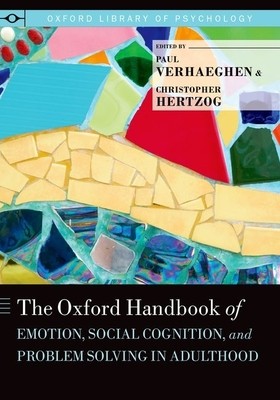
- We will send in 10–14 business days.
- Publisher: Oxford University Press, USA
- ISBN-10: 0199899460
- ISBN-13: 9780199899463
- Format: 18 x 25.7 x 2.5 cm, hardcover
- Language: English
- SAVE -10% with code: EXTRA
Oxford Handbook of Emotion, Social Cognition, and Problem Solving in Adulthood (e-book) (used book) | bookbook.eu
Reviews
Description
Over the last decade, the field of socio-emotional development and aging has rapidly expanded, with many new theories and empirical findings emerging. This trend is consistent with the broader movement in psychology to consider social, motivational, and emotional influences on cognition and behavior.
The Oxford Handbook of Emotion, Social Cognition, and Problem Solving in Adulthood provides the first overview of a new field of adult development that has emerged out of conceptualizations and research at the intersections between socioemotional development, social cognition, emotion, coping, and everyday problem solving. This field roundly rejects a universal deficit model of aging, highlighting instead the dynamic nature of socio-emotional development and the differentiation of individual trajectories of development as a function of variation in contextual and experiential influences. It emphasizes the need for a cross-level examination (from biology and neuroscience to cognitive and social psychology) of the determinants of emotional and socio-emotional behavior. This volume also serves as a tribute to the late Fredda Blanchard-Fields, whose thinking and empirical research contributed extensively to a life-span developmental view of emotion, problem solving, and social cognition.Its chapters cover multiple aspects of adulthood and aging, presenting developmental perspectives on emotion; antecedents and consequences of emotion in context; everyday problem solving; social cognition; goals and goal-related behaviors; and wisdom. The landmark volume in this new field, The Oxford Handbook of Emotion, Social Cognition, and Problem Solving in Adulthood is an important resource for cognitive, developmental, and social psychologists, as well as researchers and graduate students in the field of aging, emotion studies, and social psychology.
EXTRA 10 % discount with code: EXTRA
The promotion ends in 17d.08:36:22
The discount code is valid when purchasing from 10 €. Discounts do not stack.
- Publisher: Oxford University Press, USA
- ISBN-10: 0199899460
- ISBN-13: 9780199899463
- Format: 18 x 25.7 x 2.5 cm, hardcover
- Language: English English
Over the last decade, the field of socio-emotional development and aging has rapidly expanded, with many new theories and empirical findings emerging. This trend is consistent with the broader movement in psychology to consider social, motivational, and emotional influences on cognition and behavior.
The Oxford Handbook of Emotion, Social Cognition, and Problem Solving in Adulthood provides the first overview of a new field of adult development that has emerged out of conceptualizations and research at the intersections between socioemotional development, social cognition, emotion, coping, and everyday problem solving. This field roundly rejects a universal deficit model of aging, highlighting instead the dynamic nature of socio-emotional development and the differentiation of individual trajectories of development as a function of variation in contextual and experiential influences. It emphasizes the need for a cross-level examination (from biology and neuroscience to cognitive and social psychology) of the determinants of emotional and socio-emotional behavior. This volume also serves as a tribute to the late Fredda Blanchard-Fields, whose thinking and empirical research contributed extensively to a life-span developmental view of emotion, problem solving, and social cognition.Its chapters cover multiple aspects of adulthood and aging, presenting developmental perspectives on emotion; antecedents and consequences of emotion in context; everyday problem solving; social cognition; goals and goal-related behaviors; and wisdom. The landmark volume in this new field, The Oxford Handbook of Emotion, Social Cognition, and Problem Solving in Adulthood is an important resource for cognitive, developmental, and social psychologists, as well as researchers and graduate students in the field of aging, emotion studies, and social psychology.


Reviews